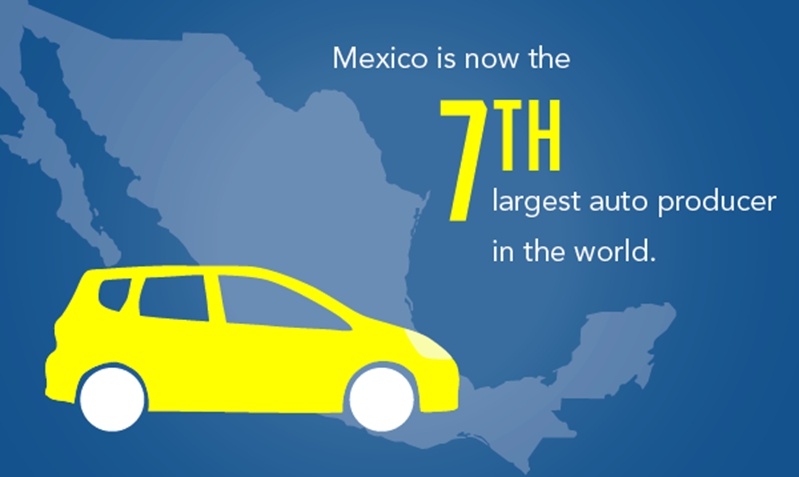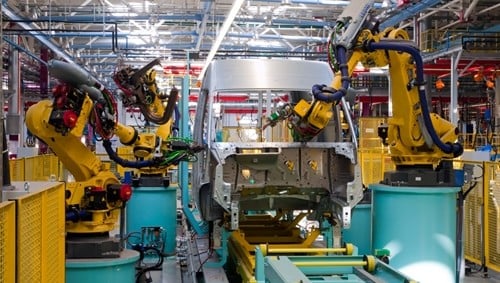Union contract negotiations between the Big Three U.S. automakers and the United Auto Workers opened this week, and Mexico looms over the talks like an enormous, inescapable shadow.
Mexico is an attractive option for automakers with globally competitive wage rates and decades of investment in education and infrastructure. Mexico's presence will be felt throughout the Detroit-based talks, and both the Big Three and union executives will try to leverage Mexican involvement in the industry to show success to shareholders and workers, respectively.
It's not all Mexico
Before looking at the particulars of Mexico's prospective impact on UAW negotiations, it's worth noting that other issues are also at play in Detroit. In late 2012, Michigan joined a growing number of U.S. states to pass right-to-work legislation.
These laws prevent unions from entering into contracts with employers that require employees to maintain union membership or dues participation. The laws went into effect in March of 2013, after the 2011 UAW contract negotiations. It will be interesting to see how the new laws - and wage competition from labor markets like Mexico and southern U.S. states - impact the conversation.
Southern U.S. states are predominantly non-union shops. In a recent report, The Detroit Free Press showed Asian and European automakers accounting for nearly half of all new vehicle production in the U.S. These automakers are building vehicles with just one third of the U.S. auto production labor pool. According to The Detroit Free Press, nearly all of those workers are non-union.
 Mexico is an attractive option for automakers.
Mexico is an attractive option for automakers.
Show me the money!
The pressure is on, but union membership isn't the only thing UAW competes for. Investment dollars for new and expanding facilities are flowing into Mexico. The Detroit Free Press reports that all automakers, Asian and European producers included, have invested $83 billion in North America in the past five years. Canadian investment claims a modest 6.5 percent of those dollars.
Mexico, on the other hand, has received more the $24 billion, nearly 30 percent. That shift in investment focus is sure to draw attention as union representatives advocate for the Big Three to keep production and assembly from migrating away from domestic plants.
Automotive News, an online resource for the North American automotive industry, reported this month that a pledge from General Motors to invest $3.6 billion in Mexico signals a willingness from the Big Three to commit to Mexico. The report also suggests that UAW negotiators may look to capitalize on the threat of operations migration to Mexico. They can show union members they are winning on contract points if automakers agree to keep production of certain models in U.S. plants.
The rising tide
While ongoing contract negotiations are sure to impact workers in Detroit, there may be no stopping the meteoric rise of automotive manufacturing in Mexico. Numbers from Automotive News illustrate a recurring theme for production of certain vehicle models assembled both in Mexico and the U.S. Production in Mexico is up while Michigan-based production is waning. While the percent change for some models is modest, Michigan production of the Chevrolet Sonic saw a 72 percent decline. Chevrolet's Ramos Arizpe, Mexico plant, which also works on the Sonic, saw a 26 percent increase.
"Production in Mexico is up while Michigan-based production is waning."
Mexico is now the seventh-largest auto producer in the world. Having recently surpassing Brazil, Mexico is now closing in on Germany. The Detroit Free Press reported that Sean McAlinden with the Center for Automotive Research anticipates Mexico's automotive workforce to double over the next four years.
According to a recent study released by The Boston Consulting Group, Mexico will need these jobs to accommodate a young, motivated and increasingly well-educated number of workers entering the Mexican job market.
Automakers in Germany and Japan are drawn to Mexico for both the attractive labor market and Mexico's free-trade agreements. Investment in Mexico grants German and Japanese producers better access to the enormous U.S. consumer market. Increased competition and the drive to keep internal costs low are certain to factor into the labor negotiation strategies of the Big Three.
Reaching effects
The global auto industry will pay close attention to how the UAW negotiations progress. Both sides will try to use Mexico. The Big Three to blunt raise increase requests, particularly from Tier 1 workers who have not seen an increase since 2007. UAW officials will try to show union members that they've kept work from moving to Mexico.
Still, the major U.S., Japanese and German automakers aren't the only industry participants making the move to Mexico. Operators at all points along the supply chain are capitalizing on the competitive wages, geographic and free-trade advantages, specialty skills and incentive programs that Mexico offers to manufacturers.
It will be difficult to calculate the actual impact the rise of Mexico's automotive manufacturing industry will have on the outcome of contract negotiations in Detroit. The message from all sides is quite clear, however. Mexico matters.
Subscribe
Sign up and stay informed with tips, updates, and best practices for manufacturing in Mexico.





